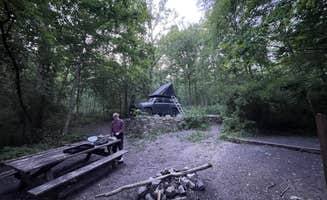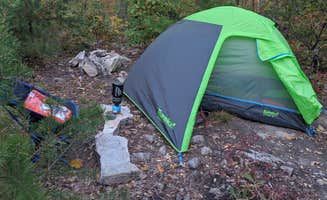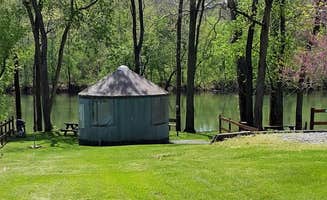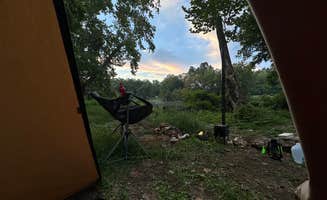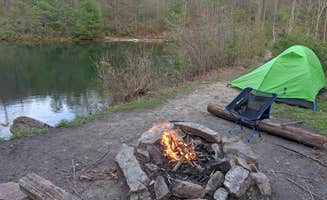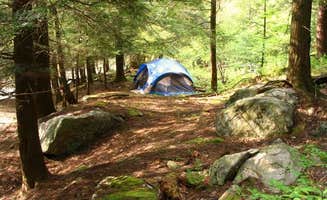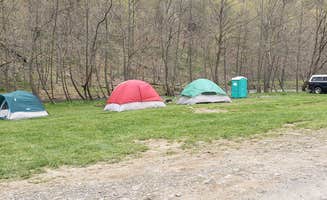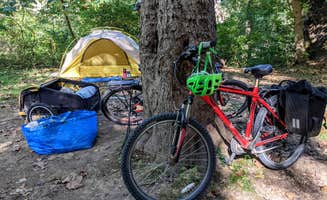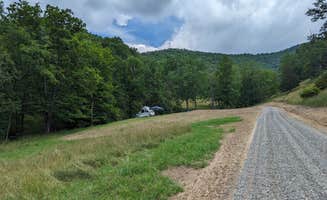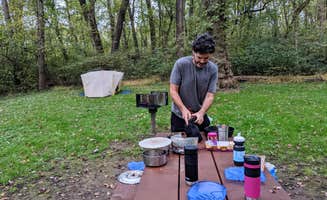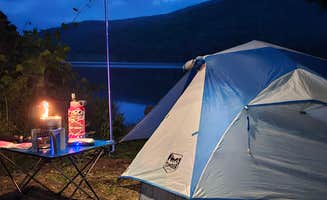George Washington National Forest provides numerous primitive tent camping opportunities surrounding Baker, West Virginia. Located in the Ridge and Valley region of the Appalachians, the area sits at elevations ranging from 1,000 to 3,000 feet, creating variable conditions throughout the seasons. Dispersed camping options typically require campers to bring all necessary supplies, including water and waste disposal materials, as services are minimal in most locations.
What to do
Hiking access: The Veach Gap - GWNF - Backpacking Site offers a challenging 4-mile uphill trek with 1,200 feet of elevation gain leading to ridgetop camping. Camper TJ W. reports, "Breathtaking views of the Shenandoah River and surrounding mountains. Very much worth the 4 mile hike up to the site." Note there's no water after the first mile of the trail.
Off-road adventures: Peters Mill Run/Taskers Gap OHV System provides dedicated trails for vehicle enthusiasts. "Great place to camp at if your car can handle it, if you like to offroad this place is for you or if you like hiking this is also for you," notes reviewer Jonny D.
River activities: The South Fork Shenandoah River access points allow for fishing, swimming, and paddling directly from campsites. Sumner C. confirms the river access, noting "The road to get to the campsite was well maintained and easy to get to. Campsites themselves were a tad overgrown but it was the beginning of the season."
What campers like
Self-registration systems: At Little Fort Campground, campers appreciate the straightforward site selection process. A Dan needs A. explains, "You select a campsite by flipping a washer on a hook on the board from green to red. Flip it back when you leave." This system allows for convenient after-hours check-in.
Riverside camping: South Fork Shenandoah River provides direct water access that campers value. Justine I. shares, "Our site was amazing! The very last car camping site on the road. We were right on the river, we swam and fished. There were plenty of walk-in sites beyond ours."
Late-season availability: Many dispersed camping areas remain open when established campgrounds close. Squirrel Hollow Road Camping offers options throughout the year, with Kevin C. noting, "We camped during the week and had nobody else camping on weekdays," suggesting less competition for sites during non-peak times.
What you should know
Weather preparedness: Mountain conditions can change rapidly in the Baker area. At Hawk Campground, Giselle P. warns about access issues: "The road in is a single lane dirt road with parts of it partially washed away. I would not want to drive on this in the rain." Many roads become difficult or impassable after precipitation.
Cell service limitations: Most sites have minimal to no connectivity. While the existing description mentions AT&T coverage at Wolf Gap, other locations report different experiences. At Little Fort Campground, A Dan needs A. states, "On this app it says T-Mobile access, I'm a T-Mobile customer, no reception at all but drive 5 minutes back down the mountain and you're good to go."
Flooding risks: Riverside camping comes with seasonal hazards. Heather at South Fork Shenandoah River cautions, "I went back early October to possibly camp again, shortly after the hurricane rains had passed. The sites were underwater or filled with river mud, making them completely un-campable."
Tips for camping with families
Scout easier access sites: For families with small children, consider Squirrel Hollow Road Camping which offers drive-up options close to the main road. Jon D. confirms, "Large campsites and relatively quite. We took two vehicles and found several suitable sites."
Pack entertainment: With limited amenities at most sites, bring activities for children. The streams and small trails around many campsites provide natural play areas, but board games and outdoor equipment help during downtime.
Consider seasonal timing: Spring and fall camping near Baker provides more comfortable temperatures but requires additional preparation. Summer weekends see increased traffic, particularly at OHV areas, which may disturb younger campers with noise and dust.
Tips from RVers
Road condition awareness: Many access roads to the best tent camping near Baker, West Virginia are unsuitable for larger rigs. At #1 Rock Tavern River Kamp, one of the few locations accommodating some RVs, Annette K. notes it offers "yurts and tent sites along with a well maintained bathhouse," providing alternatives when vehicle access is limited.
Length restrictions: Most dispersed camping areas have narrow access roads and limited turning radius. Justine I. advises, "We stayed right at the end of the road, since we have a 30 foot RV," suggesting caution when navigating forest roads with larger vehicles.
Level site scarcity: Finding level ground for larger vehicles presents challenges in this mountainous region. Bring leveling blocks and scout locations in advance, as most sites are designed primarily for tent camping rather than vehicle-based setups.


